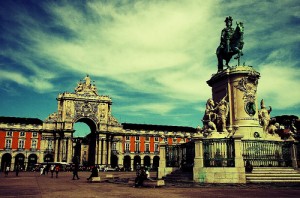Portugal has been a regular feature in international news headlines lately. Sadly, though, it is usually mentioned for the wrong reasons, such as worries about its ability to manage its chaotic finances and finance its debt. This glut of attention contrasts with the near invisibility Portugal has maintained for much of the last few decades on the international stage, with few figures other than its footballers and the occasional writer making an impact beyond its own borders.

In The Portuguese: A Modern History, Barry Hatton explores both the reasons for the country’s see-sawing international profile and the roots of its more recent economic woes.
A Lisbon-based journalist who has been covering Portugal for over 20 years, Hatton provides an absorbing portrait of a fascinating people. His history takes in all the nation’s major developments since the Renaissance, but it also takes some colourful detours down key cultural avenues, such as food, music and the national trait of disorder.
Everywhere he looks, Hatton sees contrasts and apparent contradictions. The Portuguese, he reminds us, citing the writer Miguel Torga, are “a peaceful collective of outraged people.” They rely heavily on the state, yet complain bitterly when it lets them down; their enterprising vision opened the age of discovery in the 15th century, but they then retreated into their national shell; Lisbon is a modern, relatively prosperous capital, yet the rest of the country lags woefully behind the EU’s average GDP per capita.
The Portuguese constantly finds historical echoes. The riches generated by the country’s bold discoveries in the 15th and 16th centuries were squandered, in a similar manner to the frittering away of European Union funds in the late 20th century.
“The Age of Discovery was a time of plenty, a cue to spend, spend, spend,” writes Hatton. “Antero de Quental, a nineteenth-century writer, remarked, ‘Never has a people soaked up so much treasure and remained so poor.’ And it is tempting to draw a parallel with the cash-rich days of the early years of Portugal’s EEC membership when fantastic – and politically profitable – construction projects were the order of the day while deeper, harder effort, as it turned out, was neglected.”
Another, more sudden national disaster was the defeat of young King Sebastião during a foolish foray into North Africa in the late 16th century. The heirless monarch’s death cleared the way to a period of Spanish rule, but it also spawned “Sebastianism”, a uniquely Portuguese notion that harks back to those who never quite believed their king was dead and, like modern-day Elvis obsessives, insisted he would one day return to save them. Traces of this superstitious reliance on a longed-for saviour have impeded the country’s development ever since, Hatton argues.
Having cunningly stayed out of World War II, Portugal’s greatest obstacle in the 20th century was the isolation and backwardness of the Salazar dictatorship, a regime that, like the conservatism of the Counter-Reformation, strangled creative and original thought. It left a legacy of intellectual timidity, as well as the unsustainable colonial wars in Africa. When the regime was peacefully overthrown in 1974, Salazar’s national cultural mantra of “fado, football and Fátima” was replaced by a revolutionary call for “democracy, development and decolonisation.”
All arrived at breakneck speed, even though the development has been notoriously uneven. But despite its political ruptures and the economic vultures that continue to circle above its head, Portugal’s quietly spoken but compelling culture shines through. The Portuguese is a must-read for first-timers wanting to know more about the country, but it is also a constant delight for those already well-versed in a fascinating nation.
‘The Portuguese: A Modern History’ by Barry Hatton is published by Signal.
“When Salazar was peacefully removed in 1974, …” it was Marcelo Caetano the one is removed. Thank you.
You are quite right, it has been corrected. Thanks.